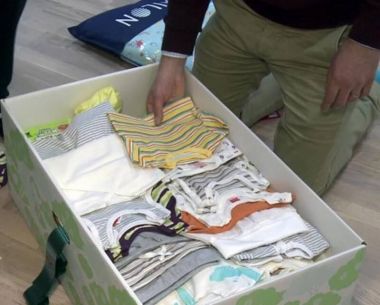One reason why Finland is really good at keeping babies alive and kicking: A box

Many couples find parenting hard, but Finland has found a way to make it easier.
For a couple, having a child can be overwhelming. Once parents realize they already have the little person in their lives, things start to become more complicated.
Finland came up with something to help parents take better care of their baby and ensure his or her survival during the first year of his or her life: A baby box.
The Finnish government gives parents expecting a new baby a cardboard box where they can put their baby in, according to BBC News. The government started giving out the boxes way back in 1938 for low-income families who cannot afford to buy cribs.
When the mother goes for a prenatal visit to a state-affiliated clinic or hospital within the first four months of her pregnancy, she is given a choice of what she wants to receive from the government: a stipend or a baby box. The stipend, currently set at 140 euros, goes up when the mom gives birth to twins or triplets. Sources say 95 percent of Finnish couples choose the baby box.
What makes the box truly special is its contents. It contains a sleeping bag, body suits, bathing products for the baby, reusable diapers, bedding, a small mattress, bibs, a thermometer, and a baby book. It also comes with condoms so the parents don't add another family member too quickly.
As a bonus, the clothes come in gender-neutral colors. They can be passed down to the next child, whether the baby is a girl or boy.
The tradition has been going on for 75 years and some say it helped Finland be on top of the list of countries with the lowest infant mortality rates.
Back in the 1930's, Finland had an extraordinarily high rate of infant deaths. After the government came up with the box, the stats changed dramatically. The gift used to be given only to low-income families. But starting in 1949, it was offered to all Finnish families.
"To get the grant, or maternity box, [expecting mothers] had to visit a doctor or municipal pre-natal clinic before their fourth month of pregnancy," said Heidi Liesivesi, who works at Kela, the Social Insurance Institution of Finland.











